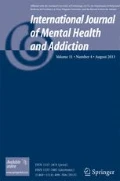Abstract
South Africa has a high lifetime prevalence of substance use disorders, estimated at 13.3% of the general population. Despite this high prevalence, treatment rates remain relatively low compared to need. A key reason for low treatment rates is the lack of expertise among professionals for the detection and treatment of substance use disorders and the limited size of the addiction care workforce. Workforce development is thus essential for the implementation of a comprehensive strategy to reduce substance-related harm within South Africa. In response to this need, the University of Cape Town has introduced a Postgraduate Diploma in Addictions Care and a Master of Philosophy in Addictions Mental Health. These postgraduate courses have been designed to equip health and social welfare professionals with the necessary skills to provide evidence-based early intervention, treatment and aftercare services for children, adolescents, adults and families affected by substance use disorders. This paper provides an overview of both programmes and reflects on lessons learnt from the inaugural group of students enrolled for the Postgraduate Diploma in Addictions Care and from the cohort of professionals who completed the Master of Philosophy in Addictions Mental Health since its inception.
Similar content being viewed by others
References
Center for Substance Abuse Treatment. (2006). Addiction counselling competencies: the knowledge, skills and attitudes of professional practice. Rockville, MD: Substance Abuse and Mental Health Services Administration. (Technical Assistance Publication (TAP) Series 21. HHS Publication No. (SMA) 08–4171).
Ellis, G.F.R., Stein, D.J., Thomas, K.G.F., & Meintjes, E.M. (Eds.). (2012). Substance use and abuse in South Africa. Insights from brain and behavioural sciences. Cape Town: UCT Press.
Hahn, J. A., Woolf-King, S. E., & Muyindike, W. (2011). Adding fuel to the fire: alcohol’s effect on the HIV epidemic in sub-Saharan Africa. Current HIV/AIDS Reports, 8(3), 172–180.
Herman, A. A., Stein, D. J., Seedat, S., Heeringa, S. G., Moomal, H., & Williams, D. R. (2009). The South African stress and health (SASH) study: 12-month and lifetime prevalence of common mental disorders. South African Medical Journal, 99(5), 339–344.
May, P. A., Gossage, J. P., Marais, A. S., Adnams, C. M., Hoyme, H. E., Jones, K. L., et al. (2007). The epidemiology of fetal alcohol syndrome and partial FAS in a South African community. Drug and Alcohol Dependence, 88, 259–271.
Myers, B., & Fakier, N. (2009). Provision of mental health services in South African substance abuse treatment facilities. International Journal of Mental Health and Addiction, 7, 441–449.
Myers, B., Louw, J., & Fakier, N. (2008). Alcohol and drug abuse: removing structural barriers to treatment for historically disadvantaged communities in Cape Town. International Journal of Social Welfare, 17, 156–165.
Myers, B.J., Louw, J., & Pasche, S.C. (2010). Inequitable access to substance abuse treatment services in Cape Town, South Africa. Substance Abuse, Treatment, Prevention and Policy, 5(28). Retrieved from: http://www.ncbi.nlm.nih.gov/pmc/articles/PMC2992042/. Accessed: 10/01/2013.
Parry, C., & Myers, B. (2011). Beyond the rhetoric: towards a more effective and humane drug policy framework in South Africa. South African Medical Journal, 101, 704–706.
Plüddemann, A., Parry, C., Donson, H., & Sukhai, A. (2004). Alcohol use and trauma in Cape Town, Durban and Port Elizabeth, South Africa: 1999–2001. International Journal of Injury Control and Safety Promotion, 11(4), 265–267.
Seedat, M., van Niekerk, A., Jewkes, R., Suffla, S., & Ratele, K. (2009). Violence and injuries in South Africa: prioritising an agenda for prevention. Lancet, 374, 1011–1022.
Sorsdahl, K., Stein, D. J., & Myers, B. (2012a). Negative attributions towards people with substance use disorders in South Africa: variation across substances and by gender. BMC Psychiatry, 12(1), 101–108.
Sorsdahl, K., Stein, D. J., Weich, L., Fourie, D., & Myers, B. (2012b). The effectiveness of a hospital-based intervention for patients with substance-use problems in the Western Cape. South African Medical Journal, 102(7), 634–635.
The Presidency (1992). Prevention and treatment of drug dependency act 1992. Pretoria: Government Printer; Government Gazette, no.13837.
The Presidency (2009). Prevention of and treatment for substance abuse act 2008. Cape Town: Government Printer; Government Gazette, vol.526, no.32150.
Acknowledgments
We would like to thank the Western Cape Department of Social Development for funding the development and implementation of the Diploma; as well as Dr Robert MacDonald and his team in the Premier’s office who provided the necessary political and practical support to make this endeavour possible. We also thank the past (Prof M. Jacobs; Prof S. Kidson), and present (Prof W. de Villiers) Deans of the Faculty of Health Sciences at the University of Cape Town for their support, as well as the CEO of Groote Schuur Hospital, Dr T. Carter. We also acknowledge all lecturers and staff who have contributed to the running of the courses.
Conflict of Interest
In the past 3 years, Dan Stein has received research grants and/or consultancy honoraria from AMBRF, Biocodex, Cipla, Lundbeck, National Responsible Gambling Foundation, Novartis, Servier, and Sun.
Sharon Kleintjes, Bronwyn Myers, Sonja Pasche and Don Wilson declare no conflict of interest.
Author information
Authors and Affiliations
Corresponding author
Rights and permissions
About this article
Cite this article
Pasche, S., Kleintjes, S., Wilson, D. et al. Improving Addiction Care in South Africa: Development and Challenges to Implementing Training in Addictions Care at the University of Cape Town. Int J Ment Health Addiction 13, 322–332 (2015). https://doi.org/10.1007/s11469-014-9537-7
Published:
Issue Date:
DOI: https://doi.org/10.1007/s11469-014-9537-7



